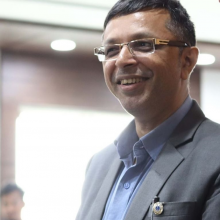How to build a strong team: 5 strategies that really work

Employment & HR
247 week ago — 7 min read
“No man is an island.”
This old quotation, which comes from a book by the English metaphysical poet John Donne (1572-1631), remains true to this day.
Success is not determined by individual contributions or lone-wolf brilliance. It is driven by a team – a group of people who share the same passion and goals, who align their core skills and capabilities for a greater cause and work together to achieve those goals. It doesn’t matter whether the team belongs to a for-profit organisation, a not-for-profit charity, a sports team or even a musical band. The bottomline is that no one can do everything or achieve all their goals alone, and everyone needs a team to succeed.
Success is not determined by individual contributions or lone-wolf brilliance. It is driven by a team – a group of people who share the same passion and goals, who align their core skills and capabilities for a greater cause.
Every team has a leader or manager, someone who harnesses individual talents in ways that benefit the entire team. S/he gets team members to collaborate effectively, provides feedback when required and keeps them on course as they journey towards success. But how can team managers build high-performing teams that ensure a successful outcome? In other words, how can they build successful teams?
Here are five ways.
1. Start by hiring the right people
This is not easy to do because whether a person is ‘right’ for the team or not is not immediately obvious. However, by following a few time-tested principles, managers can increase their chances of making the right hiring decisions and building a strong team.
It is not necessary – or even advisable – to build a team of ‘clones’. Look for candidates with diverse styles, perspectives and strengths that complement each other. These are the people who will pool their individual strengths and mitigate their individual weaknesses for the best team results.
It is also important to find candidates with the right mix of hard and soft skills. You don’t want to hire someone who is a technical expert but hates working with others. Conversely, a member who is a fabulous team player but possesses little or no essential technical skills will also become a liability.
During the hiring process, try personality assessment tests to uncover and understand candidates’ skills, strengths and motivations. You can also use these tests after you have already hired them to further your team-building efforts.
Also read: How to hire the right person for your team
2. Set clear goals and make sure you communicate them
It’s critical for every member of the team to know the team’s goals and the role they are expected to play in achieving them. If you fail to do this, your team will not be able to see the bigger picture or understand the ‘why’ of their work. They will struggle to articulate their own role and will also be unable to utilise their skills effectively.
Set clear goals and expectations. Make sure each member knows the desired outcome for the project or task, how their work will contribute to this outcome, what their responsibilities will be and which objectives they need to meet.
3. Encourage a culture of openness and transparency
Without transparency or openness, there will be no trust. And without trust, there will be no team, just a bunch of disparate individuals performing their tasks in silos without accountability or a sense of pride in their work.
Foster transparency to improve your team’s communication channels. Encourage open and frank discussions in a safe space where members know they will be heard, and not criticised or ridiculed. Identify any gaps or obstacles that need to be addressed and make plans to address them. Encourage constructive feedback, whether it is between team members, from manager to members or even from members to manager. When team communication becomes a multi-way street, it helps to improve its overall function and performance.
Also read: The key to creating a positive work environment
4. Give positive reinforcement
Team managers and leaders often forget the role of positive reinforcement to foster desirable behaviours among team members.
If you get your hiring right (see Point #1), each team member will bring something unique and valuable to the table. But you need to tell them this! Treat each member as an essential part of your operation and let them know that they are valued. If they are made to feel that their job matters, they will not question their place in the team, or feel lost or confused. Instead, they will feel a sense of purpose that will boost their motivation and ultimately affect their engagement and performance levels in positive and tangible ways.
Also read: 6 ideas for better employee engagement during the lockdown
5. Be a leader, not a manager
Yes, this is easier said than done. However, the role of a leader in building a great team cannot be overstated. A successful team needs a strong leader, not just a competent manager. This leader has the ability to identify their people’s strengths and fit them into roles that play to these strengths. They encourage mutually beneficial interactions and facilitate clear, unambiguous communication between members. They focus on shared values and also help members align their needs and goals with the needs of their team and organisation.
A leader understands that the whole can be greater than the sum of its parts and has the ability to inspire their people to share this belief. Ultimately, a strong team is led by a strong leader who helps unify individuals into a dynamic, cohesive unit that meets and even exceeds the goals that matter to the team and the organisation.
Also read: Are you a boss or a leader?
Conclusion
There is no cut-and-paste formula for building a strong team. However, the right leader can build a great team. All it takes is effort, time, patience and of course, the right team-building strategies.
To explore business opportunities, link with me by clicking on the 'Connect' button on my eBiz Card.
Image source: shutterstock.com
Disclaimer: The views and opinions expressed in this article are those of the author and do not necessarily reflect the views, official policy or position of GlobalLinker.
Posted by
Lion Amir ViraniTech Evangelist| Thought Leader | Social Entrepreneur | Enthusiastic Networker | Speaker| Startup Mentor
Network with SMEs mentioned in this article
View Lion Amir 's profile
SME Inspirations
Most read this week
















Comments (1)
Share this content
Please login or Register to join the discussion